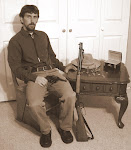 I just finished another book, Adams vs. Jefferson, written by John Ferling. Although the author conjectured too much for my taste, he also cited many sources and laid out an excellent picture of the political and cultural climate surrounding the election of 1800. He spent a great deal of time painting an accurate picture of the decade prior to that pivotal election, and even spent a chapter or two at the end letting the reader see how things unfolded until July 4, 1826, the day both men coincidentally died.
I just finished another book, Adams vs. Jefferson, written by John Ferling. Although the author conjectured too much for my taste, he also cited many sources and laid out an excellent picture of the political and cultural climate surrounding the election of 1800. He spent a great deal of time painting an accurate picture of the decade prior to that pivotal election, and even spent a chapter or two at the end letting the reader see how things unfolded until July 4, 1826, the day both men coincidentally died.I openly side with Thomas Jefferson in the debate that was at stake. He was a Republican, and believed in small federal government and state autonomy. It was important to have a strong check on the federal government by the individual states (a condition that barely exists if at all today.)
John Adams was a Federalist, and believed in stronger government and greater control, a strong monarch-like executive, and stronger ties with Great Britain. His positions were so unfavorable by the election of 1800 that a quarter century of Republican Presidents would follow him.
Of deep interest to me is the amazing coincidence that Jefferson and Adams died on the same day, July 4, 1826. This must have been Divine Providence. Adams and Jefferson had become friends again after about 1812, but in the public eye they were enemies. The dual death on the 50th anniversary of the signing of the Declaration of Independence erased the image of enmity, and allowed Adams, Jefferson, and Washington to become the "triumvirate" of the founding era, where they have remained for all those who study US History.
The party system emerged quite rapidly after the new government was formed. Politics had many of the same elements and quirks as it does now. The battle for the Presidency in 1800 was very bitter. Adams was so crushed when he lost that he left town on the 4 AM coach the day that Jefferson was sworn in, rather than pass the baton.
All in all, this was an excellent read - I recommend it to any student of US History or politics.


No comments:
Post a Comment